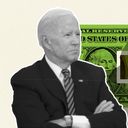The White House's new push to define Bidenomics

After months of gloom, the Biden administration is becoming more eager to define — and talk about — Bidenomics.
Why it matters: The White House isn't introducing major new policy proposals. Rather, it's talking about the Biden economic record as something to embrace, suggesting a shifting tone heading into midterm elections and beyond.
- The president's advisers see both an improving outlook for the near-term and a list of policy achievements that will support longer-term goals like rebuilding American manufacturing capacity and fighting climate change.
Driving the news: The White House released a 58-page "economic blueprint" this morning outlining what officials see as their major achievements, and yesterday Treasury Secretary Janet Yellen began an economic roadshow embracing similar themes.
Between the lines: Through roughly mid-summer, the economy and domestic policy were looking like a major drag on Democrats' political fortunes. Soaring inflation, mounting recession worries and a legislative stalemate over key elements of President Biden's plans were a toxic combination.
- But when talking to Biden administration economic officials in the last few weeks, there has been an unmistakable pep in their step.
- The passage of major legislation aimed at climate and health care (the Inflation Reduction Act) and bolstering the semiconductor industry (the CHIPS Act) have helped a lot. So have falling gasoline prices and other signs of moderating inflation pressure.
- Administration officials enthusiastically point to a recent report from Goldman Sachs' economic team arguing that a soft landing for the economy — inflation coming down without a recession — may be plausible after all.
Speaking in Detroit, with Ford executives and plant workers looking on, Yellen dusted off an economic framework she first introduced before the virtual Davos crowd earlier this year: modern supply-side economics.
- The idea is to expand the supply side of the economy — not through tax cuts or deregulation (as the traditional supply-side economics thinking goes), but through injecting large sums of cash into sectors and communities that have been "too-long neglected," which "will raise the ceiling for what our economy can potentially produce," Yellen said.
The White House blueprint cites the chance for progress on "decades-long economic challenges," which range from creating more resilient supply chains to bolstering domestic manufacturing and clean energy infrastructure.
Yes, but: There have been recent inflation victories — most significantly, a long stretch of falling gasoline prices — but there's no guarantee those will continue.
- The happy messaging on the economy may not read well at a time of soaring grocery prices and overall prices rising faster than wages (until recently, at least).
- Yellen acknowledged the Biden administration's biggest near-term challenge is bringing inflation down "without sacrificing the economic gains of the past two years."
Moreover, if Republicans win one or both houses of Congress in November, the window for major legislative accomplishments would likely close. Biden advisers see some potential for smaller-scale bipartisan bills, however, on issues like housing policy.